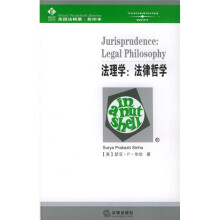OUTLINE
Chapter1.Introduction
Chapter2.PreparationfortheStudyofTheoriesofLaw
A.Non-universalityofLaw
1.TheWesternCivilization
2.TheChineseCivilization
3.TheIndianCivilization
4.TheJapaneseCivilization
5.TheAfricanCivilizations
B.IrreconcilableEpistemologiesinTheoriesAboutLaw
C.IdeologicalIncipienceinTheoriesofLaw
PARTI.THEORIESOFLAWINMETAPHYSICAL-RATIONAL
EPISTEMOLOGY
Chapter3.DivineandPropheticTheoriesofLaw
Theories
Criticisms
Chapter4.NaturalLawTheories
A.EarlyTheoriesofNaturalLaw
Theories
A.EarlyTheoriesofNaturalLawContinued
1.NaturalLawasLawofVirtue
A.Dharma(India,VedicPeriod:1500 B. C.500 B. C.)
B.Lao-Tsze(China, B.604 B. C.)
C.Confucius(China,550or551 B. C.478 B. C.)
2.NaturalLawasJusticebyNature
3.NaturalLawasLawofRightReason
4.NaturalLawasLawofGod
Criticisms
B.ModernTheoriesofNaturalLaw
Theories
1.NaturalLawasObjectivelyGivenValue:Francois
Gény(1861-1944)
2.NaturalLawasMorals:JeanDabin( B.1889)
3.NaturalLawasDeontology: A.ED’Entreves
(1902-1985)
4.NaturalLawasRelatedtoSociology:PhilipSelznick
( B.1919)
5.NaturalLawasBasedonAnthropology:MargaretMead
(19011978);and
MayEdel(19091964)andAbrahamEdel( B.1908)
6.NaturalLawasEthicalJurisprudence:MorrisRaphael
Cohen(1880-1947)
B.ModernTheoriesofNaturalLaw-Continued
7.NaturalLawastheInnerMoralityofLaw:LonL.
Fuller(1902-1978)
Criticisms
PARTII.THEORIESOFLAWINIDEALISTEPISTEMOLOGY
Chapter5.IdealistTheoriesofLaw
Theories
1.LawasHarmonizingVoluntaryActions:ImmanuelKant
(1724-1804)
2.LawastheIdeaofFreedom:GeorgWilhelmFriedrich
Hegel(1770-1831)
3.LawastheAdjustmentofPurposes:RudolphStammler
(1856-1938)
4.LawasthePrincipleofLegalEvolution:GeorgioDel
Vecchio(1878-1970)
Criticisms
1.Kant
2.Hegel
3.Stammler
4.DelVecchio
PARTⅢ.THEORIESOFLAWINEMPIRICISTEPISTEMOLOGY
Chapter6.PositivistTheoriesofLaw
A.EarlyPositivistTheoriesofLaw
Theories
1.Kautilya(India,FourthCentury B. C.)
2.Shanglang(China,?-338 B. C.)
3.ShuenTao(China,ContemporaryofShanglang)
4.HanFeiTzu(China280?-233 B. C.)Criticisms
B.LaterPositivistTheoriesofLaw
Theories
1.TheCommandTheoryofLawofthe Utilitarians:
Jeremy
Bentham(1748-1832),JohnStuartMill(1806-1873),
JohnAustin(1790-1859)
2.TheNormativeTheoryofLaw:HansKelson(1881-1973)
3.TheRuleTheoryofLaw:H.L. A.Hart( B.1907)
Criticisms
1.Bentham
2.Austin
3.Kelsen
B.LaterPositivistTheoriesofLaw-Continued
4.Hart
Chapter7.HistoricalTheoriesofLaw
Theories
1.LawasaManifestationoftheSpiritofthePeople
inHistory:
FriedrichKarlvonSavigny(1719-1861)
2.LawastheDevelopmentinHistoryofPersonal
ConditionsFrom
StatustoContract:SirHenrySumnerMaine
(1822-1888)
3.LawasanAuxiliaryinaStageofEconomic
Determinism:Karl
Marx(1818-1883)andFriedrichEngels(1820-1895)
Criticisms
1.Savigny
2.Maine
3.MarxandEngels
Chapter8.SociologicalTheoriesofLaw
Theories
A.LawinSociologicalAspects
1.LawintheSocialPurpose:RudolfvonIhering
(1818-1892)
2.LawintheInnerOrderofHumanAssociations:Eugen
Ehrlich(1862-1922)
A.LawinSociologicalAspects-Continued
3.LawintheObjectiveConditionsofSocial
Solidarity:LeonDuguit(1859-1928)
B.JurisprudenceofInterests:PhilipHeck(18581943)and
RoscoePound(1870-1964)
C.FreeLaw:EugenEhrlich(18621922)andHermannU.
Kantorowicz(18771940)
Criticisms
1.Ihering
2.Ehrlich
3.Duguit
4.JurisprudenceofInterests
5.FreeLaw
Chapter9.PsychologicalTheoryofLaw
Theory
Criticisms
Chapter10.AmericanRealistTheoriesTheories
A.PhilosophicalFrameworkofAmericanRealism:John
Dewey(1859-1952)and
WilliamJames(1842-1910)
B.ExpressionsofAmericanRealism
1.LawasRulesofConductLaidDownbyJudges:John
ChipmanGray(1839-1915)
B.ExpressionsofAmericanRealism-Continued
2.LawasProphecyofWhattheCourts
WillDo:OliverWendellHolmes,Jr.(1841-1935)
3.LawasWhatCertainOfficialsDoAboutDisputes;
Karl
N.Llewellyn(1893-1962)
4.LawasGeneralizationofPotentialLegalEffectand
ConsiderationsWeighedbyCourtsintheDecisionof
Cases:JosephW.Bingham( B.1878)
5.LawFromaPsychoanalyticalPointofView:Jerome
Frank(1889-1957)
Criticisms
Chapter1 1.ScandinavianRealistTheoriesofLaw
Theories
1.LawasConativeImpulse:AxelHagerstrom(1869-1939)
2.LawasIndependentImperatives:KarlOlivecrona( B.
1897)
3.LawDeterminedbySocialWelfare:VilhelmLundstedt
(1882-1955)
4.LawasaSchemeofInterpretationforaSetof
SocialFacts
ThatConstitutetheCounterpartofLegalNorms:Alf
Ross( B.1899)
Criticisms
Chapter12.PhenomenologicalTheoriesofLaw
Theories
1.NatureofThingApproach
2.ValuePhilosophyApproach
3.PositivistandExistentialistApproaches
Criticisms
Chapter13.TheCriticalLegalStudiesMovementandIts
Offshoots
A.CriticalLegalStudies
PhilosophicalMoorings
Criticisms
B.FeministJurisprudence
1.CommonThemes
2.VariousSchools
3.Methodology
C.CriticalRaceTheory
Chapter14.LegalPolycentricity
Chapter16.Conclusion:OnDefiningLaw
INDEX

 缺书网
缺书网 扫码进群
扫码进群




